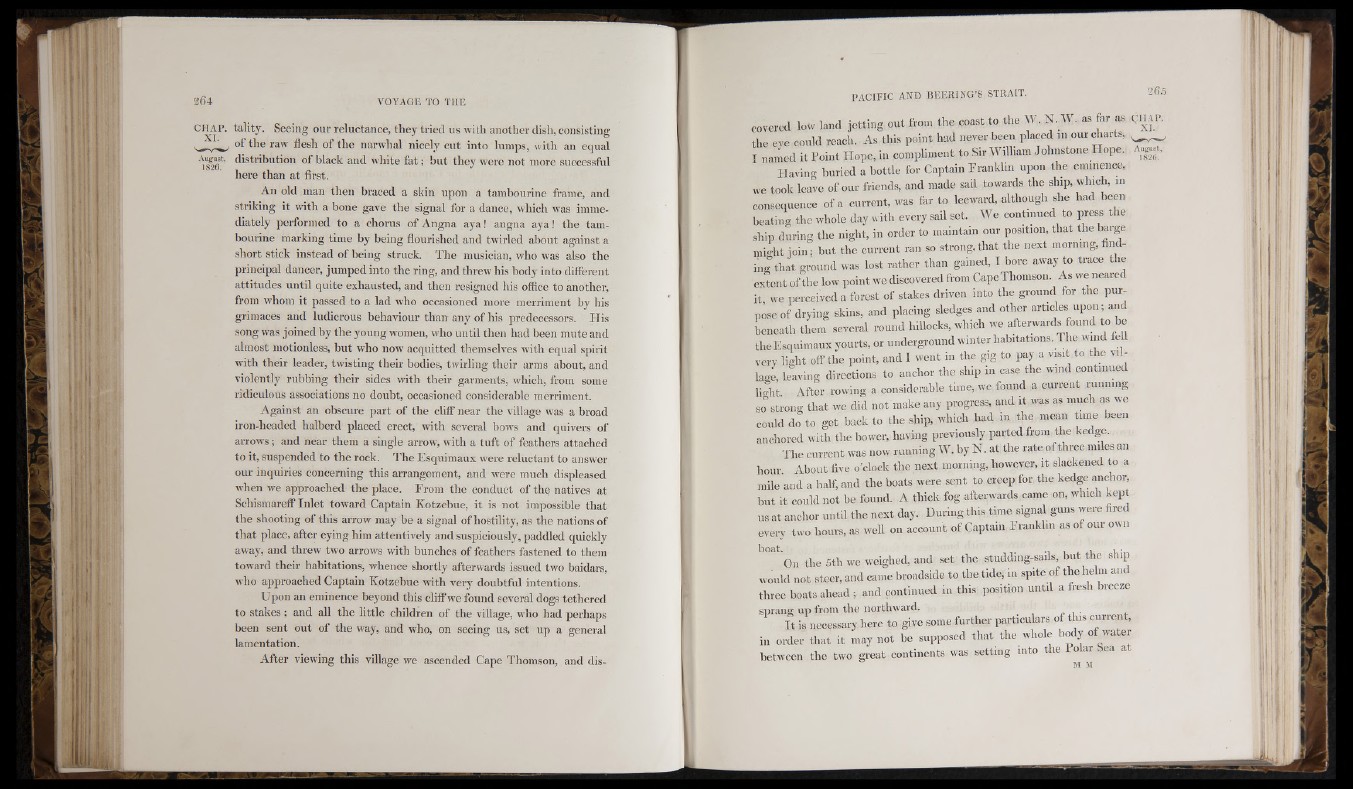
CH A P . tality. Seeing our reluctance, they tried us ivith another dish, consisting
of the raw flesh of the narwhal nicely cut into lumps, with an equal
VSie'’ ili®l'''l’ution of black and white fa t; but they w'ere not more successful
here than at first.
An old man then braced a skin upon a tambourine frame, and
striking it with a bone gave the signal for a dance, which was immediately
performed to a chorus of Angna aya! angna aya! the tambourine
marking time by being flourished and twirled about against a
short stick instead of being struck. The musician, who was also the
principal dancer, jumped into the ring, and threw his body into different
attitudes until quite exhausted, and then resigned his office to another,
from whom it passed to a lad who occasioned more merriment by his
grimaces and ludicrous behaviour than any of his predecessors. His
song was joined by the young women, who until then had been mute and
almost motionless, but who now acquitted themselves with equal spirit
with their leader, twisting their bodies, twirling their arms about, and
violently rubbing their sides with their garments, which, from some
ridiculous associations no doubt, occasioned considerable merriment.
Against an obscure part of the cliff near the village was a broad
iron-headed halberd placed erect, with several bows and quivers of
arrow’s ; and near them a single arrow, with a tuft of feathers attached
to it, suspended to the rock. The Esquimaux w’ere reluctant to answer
our inquiries concerning this arrangement, and w’erc much displeased
when we approached the place. From the conduct of the natives at
Schismareff Inlet toward Captain Kotzebue, it is not impossible that
the shooting of this arrow may be a signal of hostility, as the nations of
that place, after eying him attentively and suspiciously, paddled quickly
away, and threw two arrows with bunches of feathers fastened to them
toward their habitations, whence shortly afterwards issued two baidars,
who approached Captain Kotzebue with very doubtful intentions.
Upon an eminence beyond this cliff we found several dogs tethered
to stakes ; and all the little children of the village, w’ho had perhaps
been sent out of the w’ay, and who, on seeing us, set up a general
lamentation.
After view’ing this village we ascended Cape Thomson, and disi
Mi.
covered low land jetting out from the coast to the V . N. M • as fei as tlLU .
the eye could reach. As this point had never been placed in our charts,
I named it Point Hope, in compliment to Sir William .lohnstone Hope.
Augiiiit,
Having buried a bottle for Captain Franklin upon the eminence,
we took leave of our friends, and made sail towards the ship, which, in
consequence of a current, was far to leeward, although she had been
beating the whole day with every sail set. We continued to press the
ship during the night, in order to maintain our position, that the baige
m i l t join; but the current ran so strong, that the next morning, find-
in "that ground was lost rather than gained, I bore away to trace the
extent of the low point we discovered from Cape Thomson. As we neared
it we perceived a forest of stakes driven into tlie ground for the purpose
of drying skins, and placing sledges and other articles upon; and
leneath them several round hillocks, which we afterwards found to be
theEsquimaux yourts, or underground winter habitations. The wind fe 1
very light off the point, and I went in the gig to pay a visit to the village
leaving directions to anchor the ship in case the wind continued
liffiit After rowing a considerable time, we found a current running
so strong that we did not make any progress, and it was as much as we
could do to get back to the ship, which had in the mean time been
anchored with the bower, having previously parted from the kedge.
The current was now running W. by N . at the rate of three miles an
hour. About five o’clock the next morning, however, it slackened to a
mile and a half, and the boats were sent to creep for the kedge anchor,
but it could not be found. A thick fog afterwards came on, which kept
us at anchor until the next day. During this time signal guns were fired
every two hours, as well oil account of Captain Fraiikhn as of our ou ii
On the Sth we weighed, and set the studding-sails, but the ship
would not steer, and came broadside to the tide, in spite of the helm and
three boats ahead ; and continued in this position until a fresh bieeze
spraiis“ up from the northward.
It is necessary here to give some further particulars of this current,
ill order that it may not be supposed that the whole body of watei
between the two great continents was setting into t le o ai ea
IM M